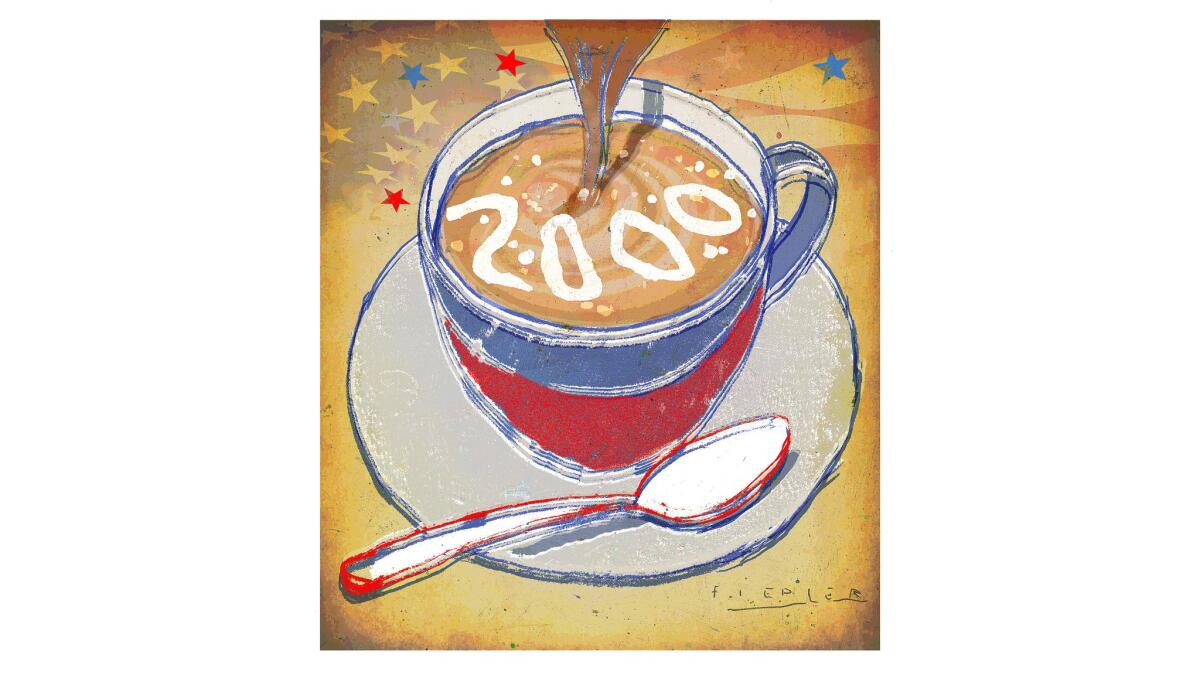L.A. Affairs: I knew she was the one when we began arguing -- over the election

- Share via
To this day, my parents both say that during their three decades of marriage, their most heated argument was about politics. It took place during the 2000 presidential election recount, when they began vehemently disagreeing about whether Ralph Nader had cost Al Gore the election.
Their nadir was Nader.
Though ostensibly negative, this moment actually came to represent a positive ideal for which to aim in my own life. My parents were so in sync that their biggest rift was caused not by vicious fights about sensitive topics such as finances, religion, parenting or affairs, but by a disagreement about politics — when they both supported the same candidate!
Given the impossibility of a lifelong union with zero disagreements, this petty tiff represented my gold standard.
Would I ever meet a woman with whom I’d be so compatible?
It was during the opening minutes of a first date, after having spent several days chatting on a dating website, now warming our hands over hot chocolate at a cozy coffee shop, that I first started to fall for Beth.
My previously published column in these pages told the tale of my doomed attempt at finding true love in the City of Angels, ultimately culminating in heartbreak. This happy-ending sequel tells the tale of how I subsequently found love after all — and, amid this most contentious presidential election, the story of how another presidential election solidified our relationship.
Beth began the conversation by mentioning that she worked for an environmental nonprofit, to which I replied that I also worked for a nonprofit, called the Journalism Industry. Her genuine laughter revealed within a minute of meeting that she liked me for “me,” rather than for reasons like income. Instantly, the conversation flowed as effortlessly as if we were long-lost best friends.
Then we played several rounds of a game my father had invented called “Abstract Concepts 11 Questions,” a takeoff on the traditional guessing game except all the answers had to be philosophical ideas like secular humanism. I’d never had a first date featuring this. Actually, nobody in history had.
The next day was that traditional second-date standby, a cemetery. We silently walked to the grave of her family member killed in Vietnam who she never got the opportunity to meet, and she cried. It was so honest, so real. Beth wasn’t trying to be “the cool girlfriend.” She was just being herself, raw. And that, in turn, made her infinitely cooler.
Our lives became a romantic-comedy movie montage. We competed against each other in a citywide air-guitar contest, me under the stage name “Air-Rock Obama,” her as “HillAIRy Clinton.” For her birthday, I gave her an original cartoon by the award-winning editorial cartoonist at the journalism publication where I worked at the time. Depicting an elephant and donkey on a seesaw, the caption read, “To Beth: May you always find your checks and balances.”
We even weathered the difficult period when she became infatuated with another man — upon attending a screening of the musical “1776,” when she developed a crush on Thomas Jefferson. “He’s brave and stands up to the British … but he’s also sensitive and plays the violin!” My status threatened, I noted that the film omitted the part where Jefferson slept with his slave.
I had never been happier in my entire life, despite my brother David’s correct assumption that, “If a woman is still with you, she must not yet know about that time you competed in the Nathan’s Hot Dog Eating Contest.”
Yet I was still uncertain if Beth was The One. Don’t get me wrong — we were wonderful together, almost ideal. But that pronouncement would be a huge leap, from which I could never turn back. In real life, how do you truly know?
After a few months together, Beth and I went on a more scholarly date: a bookstore to see an author promote his new political book. The author? Ralph Nader. On the ride back home, Beth and I got into a discussion about whether Nader had cost Gore the election.
To this day, it was the most heated argument we’d ever had.
In his Bush v. Gore dissent, Supreme Court Justice John Paul Stevens wrote: “Although we may never know with complete certainty the identity of the winner of this year’s presidential election, the identity of the loser is perfectly clear. It is the nation’s confidence in the judge as an impartial guardian of the rule of law.”
Although I may never know with complete certainty the identity of the winner of that year’s election either, an identity of a loser is now perfectly clear to me. It is someone who abandons hope of finding someone with whom he or she can be perfectly in sync.
Even if the person he/she finds thinks it was not Nader’s fault.
The author is a journalist who writes about the film industry for BoxOffice magazine and BoxOffice.com and politics for GovTrack Insider.
L.A. Affairs chronicles the dating scene in and around Los Angeles. If you have comments or a true story to tell, email us at LAAffairs@latimes.com.
More to Read
Get the L.A. Times Politics newsletter
Deeply reported insights into legislation, politics and policy from Sacramento, Washington and beyond. In your inbox twice per week.
You may occasionally receive promotional content from the Los Angeles Times.










